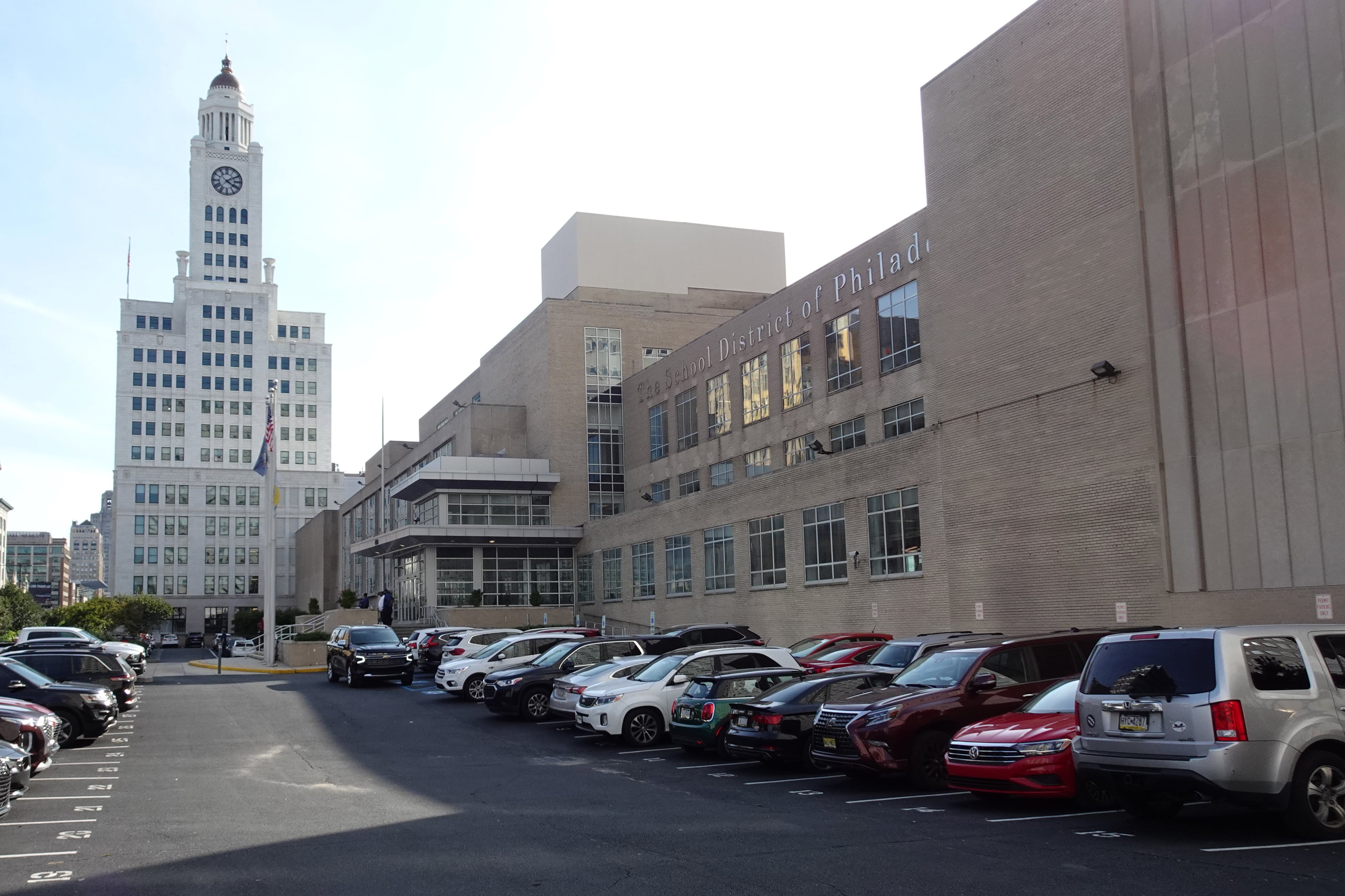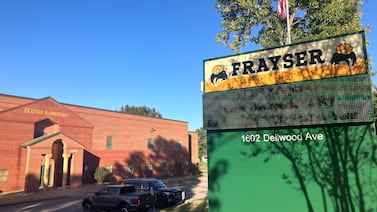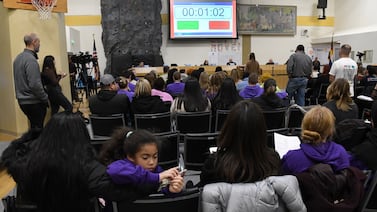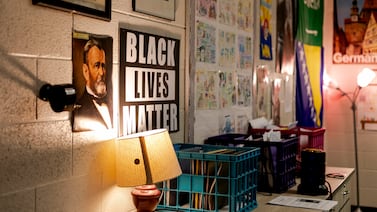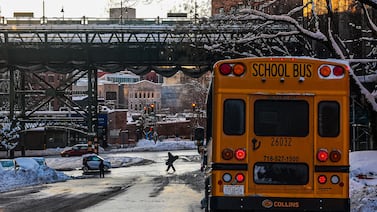Sign up for Chalkbeat Philadelphia’s free newsletter to keep up with the city’s public school system.
The Philadelphia Board of Education took the city’s first step Thursday night in a controversial process to build a new $1.3 billion basketball arena for the Philadelphia 76ers.
By a vote of 7-2, the board voted to approve an agreement that would remove the plot of land proposed for the arena from an already existing tax incentive designation. This vote clears the first hurdle in the arena-building process, even as advocates and opponents continue to pack City Council hearings raising questions and concerns. The agreement now moves to the City Council for consideration.
The board went ahead with the vote despite member ChauWing Lam urging a delay so members could fully consider the implications. She and Board Vice President Wanda Novales opposed the resolution.
“I don’t believe the benefits presented sufficiently consider the needs of our students,” Novales said. “I feel that we need to advocate for a more comprehensive approach to the community investment and student support.”
After the vote, several people in the audience shouted out, calling the board members “cowards.”
“Shame on you,” members of the public cried.
The vote does not seal the arena’s fate. If the City Council ultimately votes down the proposal in the face of mounting opposition, the board’s action on Thursday would be moot.
According to state law, the school board is required to vote on the designation before the council holds a public hearing on the same resolution.
If the arena proposal moves forward as the 76ers and Mayor Cherelle Parker intend, the team would avoid paying property taxes on the new arena altogether. Instead, they’d make annual direct payments in lieu of taxes to the city and school district — in amounts far less than what they would have paid in property taxes.
This is what is done now for the owners of the other sports facilities in South Philadelphia, including Lincoln Financial Field (where the Eagles football team plays) and Citizens Bank Park (home field of the Phillies baseball team).
In addition, as part of a separate agreement, the 76ers say they will fund several community programs, including part of Parker’s year-round school initiative.
The 76ers have negotiated “a sweetheart proposal that guarantees them a state-of-the-art facility at the expense of Philadelphia’s children,” said Lisa Li of the advocacy group Asian Americans United, which opposes the arena plan.
School board members sought to make it clear Thursday that they were not voting to approve the arena, but to remove the proposed arena land from an existing Tax Increment Financing (or TIF) district designation. TIFs are commonly used by states and localities to incentivize local economic development programs.
“The decision about whether to approve the development of the arena is entirely City Council’s. It is not our decision,” board member Joan Stern said.
But several speakers felt differently, with one characterizing the resolution as “giving the green light” to what a few called the “destructive” arena and urging the board to vote it down.
In a presentation before the board, Sam Rhoads, executive vice president of the Philadelphia Industrial Development Corporation, said that the board’s action “is in no way a vote for or against the arena.” He and city finance director Rob Dubow explained that the district would receive $2.8 million in the first year of payments in lieu of taxes compared to $550,000 paid now in property taxes from businesses on the site.
The proposal to build a new 76ers basketball arena at 10th and Market Street in Center City has polarized the city. Proponents — including Parker, who appointed or reappointed every member of the school board — argue it will create thousands of union construction jobs and economically reinvigorate that section of downtown. It also would provide a place for student graduations, high school basketball games, and other events including theatrical productions and musical concerts.
But critics of the arena plan, including all major neighborhood groups that border the proposed site, claim the arena would devastate the vulnerable nearby Chinatown community and lead to dangerous traffic patterns, in addition to depriving the school district of much-needed tax revenue at a time when it is considering closing schools.
Arena proponents say the district will benefit from the deal, but critics say the math doesn’t add up
A key part of the arena proposal is the Community Benefits Agreement that, over three decades, will contribute $50 million for programs, including $7 million for extended-day, extended-year schooling, Parker’s signature education initiative; $1 million in internships; $1.5 million for youth basketball leagues; and $3 million in free game tickets allocated to the School District of Philadelphia.
Arena supporters say that activities in and around the facility will increase overall tax revenue to the district and city from the PILOTs and Use and Occupancy tax revenue, and the liquor-by-the-drink tax, which is allocated to the district. Over the 30 years of the agreement, the city is projecting the school district will receive $153 million in revenue from the arena.
But arena opponents argue that since schools are much more dependent on property taxes than the city, district leadership could have lobbied for more money.
City Councilmember Kendra Brooks, who opposes the arena plan, called the community benefits deal “a bad agreement,” in a statement to Chalkbeat.
Brooks said even as the district is preparing to close schools, “our city is being sold out by this proposal.”
Brooks called the arrangement a “$400 million tax break” over the next 30 years. This is also not the first controversial tax break program the board of education has approved that ultimately reduces the amount of tax money the district receives in an effort to spur development. The board has no taxing power of its own and must rely on City Council and the mayor for its share of city tax dollars.
According to calculations by tax experts and academics working with a coalition of advocacy groups who oppose the arena plan, the 76ers would have contributed $400 million to the school district over the next 30 years if they paid regular property taxes on the arena. Under the current arena proposal, they say the 76ers would instead pay $50 million to the district as a PILOT.
Some of those same tax experts told Chalkbeat the 76ers’ projections for the cost of construction and their projected revenues are hard to parse and could end up costing the city $1 billion.
“The numbers that the 76ers and their consultants have presented are just fiction,” said Domenic Vitiello, an associate professor of city and regional planning at The University of Pennsylvania. He said the city should seek “real numbers” before approving a plan that reduces the amount of taxes paid to the school district.
Some speakers agreed. “Tonight’s presentation from the city was opaque at best,” Philly teacher George Dougherty testified to the board Thursday. A vote for the measure “is for billionaires and against our students,” Dougherty said.
Community activists say the arena proposal would negatively impact the school district
A group of Philadelphia public school parents are also circulating a petition opposing the arena because of the impact they say it will have on families.
“At a time when several of our Philadelphia district schools are in danger of closure, and many are in need of significant repairs, such as electrical upgrades, air conditioning, and asbestos removal, it is irresponsible and immoral for our city government to consider what amounts to a $1 billion tax break to 3 billionaires who do not even live in Philadelphia,” the petition reads, referring to the 76ers owners.
City Council members are considering nearly a dozen pieces of legislation regarding the arena project in the coming weeks. Now that the board voted to approve the TIF agreement, Council will continue its public hearings through Dec. 3, with a final meeting scheduled for Dec. 12.
If the proposal is approved, demolition for the arena is projected to start in 2026 with construction slated to begin in 2028.
Dale Mezzacappa is a senior writer for Chalkbeat Philadelphia, where she covers K-12 schools and early childhood education in Philadelphia. Contact Dale at dmezzacappa@chalkbeat.org.
Carly Sitrin is the bureau chief for Chalkbeat Philadelphia. Contact Carly at csitrin@chalkbeat.org.

